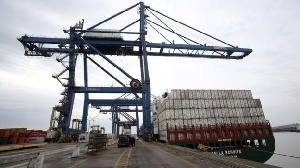Ankaful (C/R), June 27, GNA - Mr William Asiedu, the Director-General of the Ghana Prisons Service, has said the maximum security prisons at Ankaful, being built at the cost of 70 billion cedis, would become operational by the end of the year.
He said the project, which started in October last year and is now 75 per cent complete, comprises a six single storey buildings, a kitchen, dinning-hall, a football park, water-closet places of convenience and recreational facility centres and that the prison could conveniently accommodate 2,000 inmates.
Mr Asiedu said this in an address to inaugurate a 36-member prisons building team drawn from Ankaful, Winneba, Osamkrom and Sekondi prison stations at Ankaful.
The building team was established to undertake the construction of a three-bedroom 10-unit block of accommodation for junior prison officers at Ankaful by the end of the year and other service building projects. He said the maximum security prison, which would be the first of its kind in the country, would surpass the Nsawam medium security prison that was built initially to accommodate 717 inmates but now has 2,913 prisoners in it.
Mr Asiedu said the maximum security prison would accommodate accused persons who are sentenced to 20 years imprisonment and above and hardened criminals.
When it becomes operational, this category of criminals in Kumasi, Nsawam and other prison stations would be transferred to the Ankaful maximum security prison.
Mr Asiedu expressed concern over the poor state of the training facilities at the prisons that made it impossible for trade instructors to impart skills to inmates and stressed the need for the prisons to have adequately equipped workshops to ensure effective acquisition of employable skills by the inmates.
Mr Asiedu said in 2005, out of over 9,000 convicts, only 698 of them benefited from vocational training in the prisons and described this as insignificant.
He commended the government for signing a six-million-dollar contract with Paramount Logistics Co-operation of South Africa that would enable the Prison Service take delivery of workshop equipment, vehicles and other logistics by the end of the year. This would boost industrial training in the prisons and strategically position the service to increase its income generation ventures.
Mr Asiedu said the Retention Bill has been passed by parliament and the service could now retain 60 percent of its generated income to undertake its activities and promote the welfare of the officers. Mr Oppong Tweneboa-Kodua, the Regional Prison Commander, said the building team comprising, masons, carpenters, steel benders, electricians, plumbers and painters, among others, drawn from the other prison stations, would be supervised by the prison's architects at headquarters in Accra.
This would save the government a lot of money and that it would enable the government and Ghanaians in general to know that the service was not a "waste pipe" and given the needed resources it could build its own houses and generate income as well, thereby not relying solely on the government for support.
He said the building team could train the inmates to become self-employed after serving their sentences.
General News of Wednesday, 27 June 2007
Source: GNA
Ankaful Maximum security prison to be operational by end of year
Opinions











